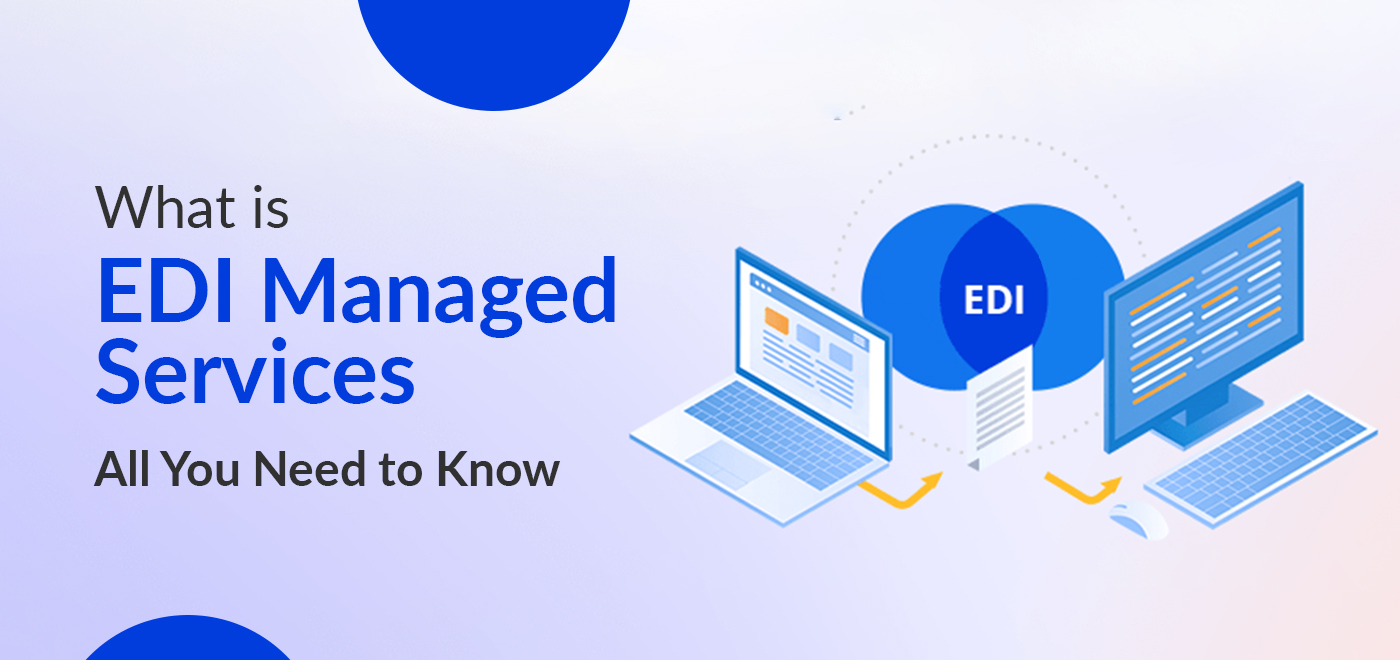As we navigate our rapidly evolving digital landscape, EDI managed services have sprung forth as vital tools for refining business procedures. So, what is EDI? It stands for Electronic Data Interchange, a savvy way for businesses to exchange vital data. Coupled with ‘managed services,’ it implies a trusted third-party expert is supervising these electronic data interchange processes.
EDI isn’t a recent innovation. Its roots go back to the 1960s, first adopted by the transport sector to digitally exchange documents. As enterprises saw their potential, it swiftly extended to other fields.
But EDI’s adoption wasn’t always easy. Initially, it required heavy investments in hardware and software, plus a solid grasp of complex technical norms. EDI managed services changed all that. They made EDI accessible and affordable to all businesses, turning a once intimidating task into an easy operation.
Now, EDI-managed services are widespread across diverse sectors, from retail to healthcare, reshaping the way businesses manage their data.
To put it simply, mastering EDI-managed services is vital for any business hoping to excel in our data-centered world. Also, it’s like studying the driving manual before getting behind the wheel; knowing how EDI-managed solutions operate will aid your business in maneuvering the intricate pathways of data exchange.
What is Electronic Data Interchange?
Before EDI, sharing documents like orders, invoices, or shipping notes was a manual and time-consuming job. It was like writing each business paper by hand, packing it, and mailing it to your business associate. So, this method needed to be faster had many mistakes, and was costly.
EDI entered the scene and changed everything. Suddenly, these documents could be shared electronically, straight from one computer to another, with no human help needed. It felt as if businesses had exchanged their slow horse carts for a fast, sleek train. The change was truly remarkable.
At its core, EDI operates by turning data into a common format that different computer systems can easily grasp and handle. Also, it’s like people from diverse countries using a shared language to communicate with each other. By using the same ‘language,’ these systems can exchange information fast and efficiently, resulting in many benefits.
One key benefit of EDI is its speed. Business deals that used to take days, or even weeks, can now finish in just minutes. But the benefits continue beyond there. EDI also greatly lowers the chance of mistakes by removing the need for manual data entry. Fewer mistakes mean less time and money spent fixing them.
When Electronic data interchange teams up with managed services – creating EDI managed services – these benefits get even better. This is because daily management of the EDI task is done by experts, allowing businesses to concentrate on their core strengths.
Plus, by choosing Electronica Data Interchange managed solutions, businesses get access to a team of professionals who can help them handle the complexities of EDI, ensuring they always get the best out of their EDI services. These experts manage the technical side of things but also give priceless advice on how to make the most out of EDI.
What Are EDI Managed Services?
Choosing EDI managed services means handing your electronic data interchange operations to a third-party expert. The EDI solution providers take care of managing all EDI processes. From setting up the systems and ensuring correct and secure data to maintaining clear communication with all trading partners, they handle it all.
In easy terms, EDI managed solutions are like having your own EDI expert team. They manage your EDI operations, so you can focus on running your business effectively.
Key Components of EDI Managed Services
Now, let’s look closely at the main parts of EDI-managed solutions.
Firstly, we have the technical structure. EDI service providers have strong systems in place for secure and smooth data transfer. They handle all technical bits, from EDI translation to network services. Thus, businesses can remember the technical stuff.
Next is the compliance part. The rules for EDI can be tough and varied, and it’s hard to meet all trading partners’ requirements. EDI managed service providers handle this, making sure data is always correctly formatted and sent.
Lastly, there’s the support part. When you choose EDI-managed services, you get access to an expert team ready to help when needed. Be it sorting out technical problems or giving advice on best practices, support from EDI solution providers is an essential part of EDI managed services.
How does it Work?
EDI-managed services link up with your current business systems and work as a mediator for all your data-sharing requirements.
To put it simply, your business system, such as an ERP (Enterprise Resource Planning) or an accounting system, creates a file that needs to be exchanged. This file could include an invoice, a purchase order, or any other business document. This is when the EDI managed solutions system steps in.
Let’s break this process down to understand better the workflow of EDI-managed services.
- Data Extraction: This system takes the file, pulls out the data, and converts it into a format the receiving system can understand. This is crucial as different businesses might use varying systems and formats.
- Data Transmission: Next, EDI managed services send off the data securely to the business partner. They can use different ways to do this, like FTP (File Transfer Protocol), AS2 (Applicability Statement 2), or even the Internet.
- Acknowledgment Receipt: Once the data is sent, the receiving system sends a thumbs up. This tells us the data arrived and is now being processed. If there’s anything wrong with the data, we get to know it at this stage.
- Data Reception and Translation: On the receiving end, a similar process takes place. The EDI-managed services there take the incoming data, change it back to a format their business system can understand, and then feed it into their system.
What drives EDI managed solutions is a cocktail of intricate technology working together effortlessly. It uses EDI standards (like ANSI X12 or EDIFACT), data conversion software, and secure communication methods. Plus, there are automated systems and tools to watch over, manage, and fix the entire EDI process when needed.
Benefits of EDI Managed Services
Let’s dig deeper into the main perks that make EDI-managed services a wise pick for up-to-date firms from EDI Companies in the USA:
- Efficiency: EDI managed services robotize the full process of data exchange, cutting the need for manual entry and the chance of errors that come with it. This leads to quicker, more exact deals and improved productivity.
- Cost Savings: Handing over EDI tasks to an EDI service vendor can lead to significant cost savings. Firms can dodge investing in high-cost software, hardware, and the hiring of expert staff.
- Better Accuracy: The robotization offered by EDI-managed services slashes manual entry and minimizes errors. This boosts data accuracy, leading to slicker operations and better business choices.
- Scalability: As your firm grows, so do your EDI needs. EDI managed solutions vendors can easily size up their services to match your growth, making sure you can handle a rise in data exchange volumes without hiccups.
- Top-notch Customer Service: Quicker, more exact data exchange leads to top service for your clients. You can handle orders more swiftly, resolve issues faster, and update clients instantly, thereby boosting client satisfaction.
- Compliance: EDI-managed services make sure that you stay in line with any industry norms or rules. This is key in fields like healthcare or finance, where data exchange rules are strict.
The Limitations and Challenges
Even the best services, including EDI-managed services, are free of challenges. Here are some potential constraints you may encounter when using EDI managed solutions:
- Transition Challenges: Moving from traditional Electronic data interchange or manual data trading methods to EDI-managed services can take time and effort. It demands thoughtful planning, allocating resources, and possibly much time for a smooth transition.
- Vendor Reliability: Your EDI managed services’ reliability lies in your service provider’s hands. If they face any downtime, it could upset your business flow. Therefore, selecting a trustworthy EDI service provider is vital.
- Data Security: Sharing data, particularly sensitive details, always carries some risk. Hence, it’s crucial to verify that your EDI service provider takes strong safety measures to guard your data.
- Cost: While EDI-managed services could help save costs in the long run, the initial investment can be hefty. For smaller businesses or new ventures, this cost might take a lot of work to bear.
- Integration with Existing Systems: If your current systems and software don’t align with the EDI solution offered by your vendor, extra effort and cost might be needed for flawless integration.
- Dependency on Service Providers: With EDI managed solutions, businesses lean heavily on their service providers. If any issues turn up with the provider, it could affect business activities.
- Training and Education: Employees may need to be trained to navigate and operate the new systems effectively. This could be time-consuming and might hinder operations during the transition period.
Even with these possible challenges, many businesses find that the advantages of EDI managed solutions balance out these hurdles. It’s about acknowledging these limitations, discovering ways to tackle them, and teaming up with a dependable EDI service provider for a trouble-free transition and consistent operation.
How to Choose the Right EDI Managed Services Provider
Finding the best electronic data interchanged managed services provider is more than looking at tech skills. You need to think about several things like:
- Experience: A provider with a solid past is important. Look at their past work, their clients, and their business history.
- Flexibility: Your business will change and grow. Your EDI provider should be able to handle these changes. A provider who can adjust their services will be a great partner for your journey.
- Integration Capabilities: The EDI solutions should work well with your current systems. Any hiccups can lead to extra time and money spent.
- Security Measures: As we spoke about this before, keeping data safe is vital. Check that your provider uses strong security methods to keep your data protected.
- Support and Training: A good EDI managed services provider should offer training to your team and keep supporting you for smooth operations.
Future Trends:
As we journey deeper into the 21st century, EDI-managed services are adapting and evolving, keeping up with fresh technologies. EDI solutions are expanding, venturing into new spaces, and reinforcing the core of electronic data exchange.
In discussing the future of EDI managed solutions, it’s crucial to recognize the influence of technology, especially in realms like artificial intelligence (AI), machine learning (ML), and blockchain.
- Integration with AI and ML: AI and ML can automate various processes in EDI, decreasing human errors and intervention. They can help in spotting trends, find obstacles, and propose enhancements.
- Use of Blockchain: Blockchain tech can bolster data safety and traceability in EDI dealings, offering extra trust for businesses.
- Improved Analytics: The future of EDI managed services will witness a surge in advanced analytic abilities. This will gift businesses with deeper insights, aiding them in making well-informed decisions.
- Real-time Data Exchange: With technology’s progression, data interchanging will hasten, aiming towards real-time exchange, slashing delays, and boosting efficiency.
Emerging tech holds the power to transform EDI radically managed services. They will amplify the efficiency, safety, and dependability of these services, rendering them an even more appealing choice for businesses.
In particular, sectors such as healthcare that deal with sensitive data have enormous benefits to reap. Healthcare EDI companies are predicted to utilize these developments to enhance their offerings. For instance, blockchain tech can make data more secure and trackable, which is vital in a field where patient data privacy is key.
Though the future’s curtain is still descending, one thing is clear. These services, backed by advancing tech, are here for the long haul and will continue to grow, making data exchange simpler, safer, and more efficient than ever before.
Conclusion
EDI-managed services are flexible, can be adjusted, and are useful, fulfilling diverse needs in our rapid, digital era. They come with perks like cost cuts, improved efficiency, and enhanced precision, which makes them a compelling pick for businesses.
However, EDI managed solutions, like all technology, aren’t without their flaws. However, the trick is selecting a fitting provider, understanding your requirements, and tailoring the services to suit them.
The days ahead look promising for EDI managed services. New tech like AI, ML, and blockchain promise to upgrade their abilities even more. Picture it like a train speeding towards a more efficient and secure future – and it’s key for businesses to be on board.
So, are you set to go ahead? Prepared to make your data transfer more streamlined, exact, and safe? If that’s a yes, it’s the right moment to think about this service with Toporgs. Explore further, comprehend your needs, and identify the perfect provider. Be bold in posing queries and gaining more knowledge.
Remember, it’s about your firm, your data, and your triumph. EDI managed solutions are simply a means to help you achieve it. So, make the decision now and step into the future of data exchange. Don’t forget the initial step is always the most critical.
So, let’s set off on this voyage of efficient data exchange together with EDI managed services.
FAQs
What is EDI, and how does it work?
Electronic Data Interchange (EDI) is a simple way to shift data between varied computer systems or networks. It does so by changing documents and data into a normal format that these systems can understand. EDI-managed services make this easier, doing the hard tasks tied to electronic data interchange. This ensures smooth and quick data exchange.
What makes EDI managed services different from traditional EDI?
It stands out from traditional EDI because of the added services they give. Traditional EDI just gives the structure for data exchange, but EDI-managed services do more. They give services such as data mapping, integration, monitoring, and support.
What are the key benefits of using EDI managed services?
These services bring several advantages. First, they make operations more efficient by automating the data exchange. Next, they improve data accuracy by getting rid of manual mistakes. Then, they allow for data exchange in real time, making the decision-making process better. Lastly, they help save costs by cutting down on manual and paper-based tasks.
Are there any limitations or challenges to using EDI managed services?
Like all technology, these services come with their own challenges. These might include a tough implementation process, the need for regular maintenance, and possible issues with matching existing systems. But, with a good EDI-managed services provider, these issues can be handled well.
How do I choose the right EDI-managed services provider for my business?
Choosing the best EDI-managed services provider needs an understanding of your company’s needs and aims. Think about things like the provider’s know-how, the scalability of their services, support abilities, and how well they match your existing systems. Above all, make sure that their services fit well with your company goals.




